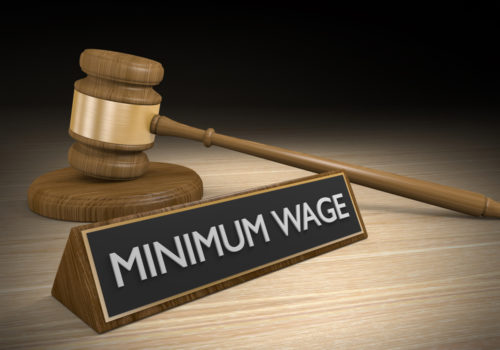The minimum wage was introduced in the United States in 1938, at a rate of $0.25 per hour. Since then, the minimum wage has risen to a nation-wide rate of $7.25. Some states and cities have implemented higher minimum wages. The purchasing power of the minimum wage peaked in 1968, and has since declined to the point where it can be difficult for an individual or family to support themselves on the minimum wage alone.
While some countries have implemented a maximum wage, which caps the earnings for individuals in order to reduce income inequality, the United States has not implemented such a measure.
Analysts calculate that a living wage — that is, a wage that would allow an individual or family to support themselves — would have been $16.07 in 2017. Because of the discrepancy between a living wage and the current minimum wage, politicians and activists alike have argued that the minimum wage should be raised. Raising the minimum wage would have many benefits, including stimulating the economy, reducing employee turnover, and resulting in an increase in quality of life for low-wage workers.
However, opponents to raising the minimum wage argue that an increase could potentially hurt the economy and the working class. If businesses were forced to pay their employees more, they might hire less people, resulting in an increased unemployment rate. Businesses might also have to increase their prices, resulting in a spending slump that could hurt the economy. Critics of raising the minimum wage have proposed several other alternatives that could benefit the working class while keeping the minimum wage at its current level.
Table of Contents
Increase the Earned Income Tax
The earned income tax credit is a credit that benefits mid- and low-income households, particularly those with children. It encourages work and can, in some cases, offset income taxes, resulting in a potential credit of up to $6,557. The Earned Income Tax Credit is also refundable, meaning that individuals are eligible for a refund representing the full cost of the credit, even if they paid less income tax in a given year.
However, the Earned Income Tax also employs a trapezoid structure, which phases in benefits over time depending on how much you earn, and can reward mid-level earners while neglecting those with an extremely low income. Critics argue that this effectively punishes the most vulnerable Americans who are living in poverty, while benefiting those who are better off.
Decrease Health Insurance Premiums
Decreasing health insurance premiums is another strategy to boost benefits to the working class without increasing the minimum wage. Health insurance premiums represent a prohibitive cost to many Americans, and take up an outsized portion of low- and middle-income families’ budgets. Decreasing health insurance premiums would also save businesses money, and might encourage them to raise wages of their own accord.
Because health insurance premiums (and the cost of healthcare in general) often present an outsized burden for the working class, a variety of strategies have been proposed for reducing healthcare costs. Advocacy for a simplified universal healthcare system, sometimes also known as single payer or Medicare for All in America, has gained increasing support in recent years as a way to reduce healthcare costs and improve quality of life for working class people.
Create a Universal Income Program
Creating a universal income program is another strategy that some critics of raising the minimum wage propose in order to benefit the working class. Sometimes also known as Universal Basic Income or UBI, a Universal Income Program provides citizens with a guaranteed flat, universal income regardless of their employment status.
Advocates for a Universal Income Program argue that it can help to raise people out of poverty, combat the effects of increasing automation in the workplace, and provide a safety net to vulnerable Americans. Some critics argue, however, that it would be difficult to prevent businesses and landlords from raising their prices a corresponding amount, and that a Universal Income Program might lead to increased inflation.
Implement Training Programs
Training programs are another way that workers can gradually increase their own earnings, without an increase in the federal minimum wage. These programs allow workers to develop new skills, making them more competitive in the job marketplace. The goal of training programs is ultimately to encourage low-wage workers to seek employment that is better compensated by giving them the skills they need to adequately perform higher-wage work.
One of the main arguments behind the implementation of training programs instead of a minimum wage hike is that an increase in the minimum wage would encourage workers to become complacent rather than trying to better themselves. However, studies show that an increase in the minimum wage actually results in increased employee performance and productivity. In addition, critics argue that all workers should be compensated adequately for their labor even if they are not high-skilled, including young people, the elderly, and the disabled.
Enhance the Ability to Save for Retirement
Because of their precarious position when it comes to earning enough money to get by, many people who earn a minimum wage find it difficult to save for retirement. This can exacerbate their financial difficulties as they reach retirement age, causing them to sink further into poverty. If businesses were to adopt strategies toward enhancing the ability of low-income workers to save for retirement, it could provide a financial incentive to saving up money for old age.
However, low-income workers already living on a shoestring budget may not be able to set aside the funds necessary to invest in retirement accounts when they are already struggling just to make ends meet. Unlike a minimum wage increase, which would benefit low-income workers soon after it is enacted, a benefit when it comes to retirement would not immediately increase the quality of life of working class people.
Critics of an increase to the minimum wage have put forth a variety of alternatives designed to benefit working class people without putting an undue burden on employers or the economy as a whole. However, many of these proposals still fall short of the immediate, tangible benefit to low-income workers that would result from an increase to the minimum wage.
As the minimum wage continues to lag behind a living wage, there is increasing advocacy to raise the national minimum wage, including popular movements like the Fight for $15, which advocates that the federal minimum wage be raised to $15. With income inequality on the rise in America, raising the minimum wage may be one of the most effective ways to reduce poverty and increase the quality of life of the working class.
Image Source: https://depositphotos.com/





